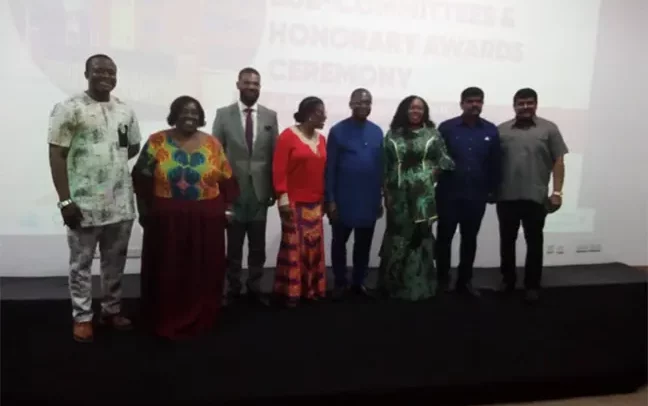President of NALAG (left) with other guests at the event
The National Association of Local Authorities of Ghana (NALAG) launched three strategic documents and inaugurated sub-committees on May 14, 2025, in Accra.
The strategic documents, namely the Gender Strategy, Advocacy Strategy and Communication Strategy, were designed to address gender issues within the local government.
In a speech read on behalf of the Minister of Gender, Children and Social Protection, Dr. Agnes Naa Momo Lartey, she stated that the Gender Strategy document will enable NALAG to promote gender equality and equity by integrating gender perspectives into its decision-making processes, ensuring that the needs of both men and women are met, leading to a more inclusive and sustainable development outcomes.
“The Gender Strategy will enable NALAG and Metropolitan, Municipal and District Assemblies (MMDAs) to promote gender equality and equity in community activities by integrating gender perspectives into decision-making processes, and ensure that the needs and concerns of both women and men are addressed. This will lead to more inclusive and sustainable development outcomes,” she explained.
According to her, the Advocacy Strategy is meant to empower NALAG and local governments to effectively advocate for gender sensitive policies and programmes at the local level. She also added that by building partnerships and mobilising stakeholders, NALAG can create a conducive environment for promoting gender equality and women’s empowerment.
“The Advocacy Strategy specifically will empower NALAG and other local governments to effectively advocate for gender sensitive policies and programmes at the local level. By building partnerships and mobilising stakeholders, we can create an enabling environment for promoting gender equality and women’s empowerment,” she stressed.
The Communication Strategy, she said, will aid in the dissemination of information and knowledge on gender issues to stakeholders, including community members, traditional leaders, assembly members and local government officials.
“The Communication Strategy will facilitate the dissemination of information and knowledge on gender issues to stakeholders, including community members, traditional leaders, assembly members and local government officials. By raising awareness and promoting dialogue, we can build a culture of gender sensitivity and responsiveness,” she added.
Dr. Lartey expressed optimism that the document would have a significant impact on community activities, including promoting women’s participation in decision-making processes, addressing gender based violence and discrimination, increasing access to education and healthcare for women, supporting women’s economic empowerment, and encouraging men’s involvement in promoting gender equality.
In a bid to drive its objectives and enhance operational efficiency, NALAG’s sub-committees were formally inaugurated, namely: Finance and Administration, Policy and Resolutions, Economic Development, Environment, Sanitation and Tourism, Gender and Development, International Relations and Public Relations.


